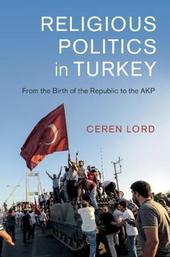
|
Religious Politics in Turkey: From the Birth of the Republic to the AKP
Hardback
Main Details
| Title |
Religious Politics in Turkey: From the Birth of the Republic to the AKP
|
| Authors and Contributors |
By (author) Ceren Lord
|
| Series | Cambridge Middle East Studies |
|---|
| Physical Properties |
| Format:Hardback | | Pages:386 | | Dimensions(mm): Height 235,Width 158 |
|
| Category/Genre | Islam |
|---|
| ISBN/Barcode |
9781108472005
|
| Classifications | Dewey:322.109561 |
|---|
| Audience | | Professional & Vocational | |
|---|
| Illustrations |
Worked examples or Exercises
|
|
Publishing Details |
| Publisher |
Cambridge University Press
|
| Imprint |
Cambridge University Press
|
| Publication Date |
8 November 2018 |
| Publication Country |
United Kingdom
|
Description
Since the elections of 2002, Erdogan's AKP has dominated the political scene in Turkey. This period has often been understood as a break from a 'secular' pattern of state-building. But in this book, Ceren Lord shows how Islamist mobilisation in Turkey has been facilitated from within the state by institutions established during early nation-building. Lord thus challenges the traditional account of Islamist AKP's rise that sees it either as a grassroots reaction to the authoritarian secularism of the state or as a function of the state's utilisation of religion. Tracing struggles within the state, Lord also shows how the state's principal religious authority, the Presidency of Religious Affairs (Diyanet) competed with other state institutions to pursue Islamisation. Through privileging Sunni Muslim access to state resources to the exclusion of others, the Diyanet has been a key actor ensuring persistence and increasing salience of religious markers in political and economic competition, creating an amenable environment for Islamist mobilisation.
Author Biography
Ceren Lord is British Academy Postdoctoral Fellow in Middle East Studies at the Oxford School for Global and Area Studies at the University of Oxford. She is also Associate Editor of the British Journal of Middle Eastern Studies.
Reviews'A captivating book and a welcome addition to a growing genre of critical scholarship on secularism in Turkey.' Sinem Adar, EuropeNow '... [Religious Politics in Turkey] makes an important point that should revise our understanding of Turkish politics.' David C. Unger, Survival: Global Politics and Strategy '... rich with ideas and detail ...' John Waterbury, Foreign Affairs '... Religious Politics in Turkey enables the reader not only to overcome the superficial struggle between authoritarian laicism deriving from state elites and conservative sensitiveness stemming from society, but also to provide a multidimensional framework to comprehend state-religion relations in Turkey.' Mehmet Ertan, New Perspectives on Turkey 'Religious Politics in Turkey is a meticulously argued and empirically rich case study ... Its general analytical framework makes the book highly relevant to students of nationalism, democratization, and social movements as well as students of religion and politics.' Yesim Bayar, Political Studies Review '... emerges as a new piece of research, claiming to discuss a new dimension of this intricacy, beyond the classic readings of religion, law, and politics in Turkey ... Lord's book stands out as a fine study of Turkish politics, Turkish religiosity, and Turkish secularism and is a work at which everyone concerned with these issues should at least take a look.' Ahmet Erdi Ozturk, Journal of Law and Religion 'Ceren Lord's Religious Politics in Turkey: From the Birth of the Republic to the AKP is valuable for the light it casts on the intertwined and often complex relationship between state, religion and society in Turkey.' Elizabeth Bishop and Victoria Elizondo, Immigrants & Minorities '... Lord's book is a great contribution to the growing field of critical scholarship on secularism in Turkey for its analytical meticulousness and the use of a unique data set on the institutional history of the Diyanet.' OEmer Faruk Koc, Politics, Religion & Ideology '... every statement made is consistently supported by sound evidence and a broader theoretical framework that makes sense. The level of detail in the information provided and the extent of clarity and consistency makes this book not only a reliable read but also a distinguished example of the post-positivist outlook in Turkish studies.' Durukan Imrie-Kuzu, National Identities
|